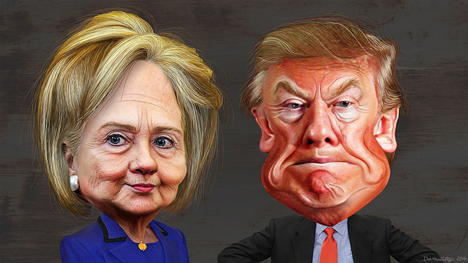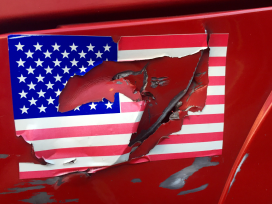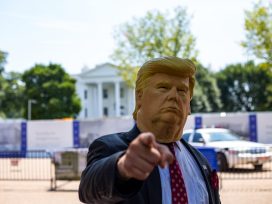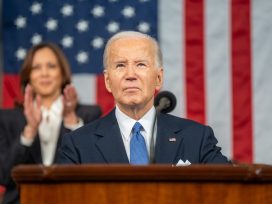Admit it. Watching the US Presidential primaries for the past year was fun. A scary kind of fun, filled with foreboding but also with comical moments, overstatements, bare-faced lies, insults traded between candidates like fans at a wrestling match, physical violence unheard of in US elections for the past 100 years.
It was impossible to find a framing image for what we were witnessing. A circus? A TV reality show run amuck? A schoolyard brawl magnified by gigantic TV screens? We were swept up by what decades ago Jean Baudrillard called “hyperreality” – a flood of sensory fragments, rumours, digital images that imitated reality but were more intense and alluring than everyday life.
Now the primaries and conventions are over. The campaigns will be uglier but more familiar. Two of the most unpopular candidates in history will compete in a contest that won’t even pretend to be polite or civilized.
In this rare moment of calm it might be useful to take a look backward to try to understand what we’ve just gone through. It might even help to take a glance farther back in history to see if Clio, the most neglected of the Muses, has anything to tell us about how we got here and where we’re heading.
The circus and the boxing match
In the bad old days, Republican Presidential candidates were chosen behind closed doors of a party as organized as a Marine battalion. But this year was different.
At the first Republican debate on 6 August 2015, an incredible 17 candidates showed up to run for President. By any standards, they were a gang of dunces and rogues.
Among many others, there was Jeb Bush, reputed to be the “intelligent” brother in the Bush dynasty, who quickly proved to be so meek and confused that even his supporters cringed whenever he opened his mouth. There was first-term Senator Ted Cruz, who made so many enemies in a few years in Congress that the outgoing Speaker of the House called him “Lucifer in the flesh” and a “miserable son of a bitch”. There was Carly Fiorina, who had mismanaged all the companies she’d headed-Hewlett-Packard was the most prominent-while walking away with huge severance packages.
And there was the Donald, a clownish figure whose name was emblazoned on gaudy condo buildings in Manhattan and who played a version of himself on a TV reality show. But however comical his public persona, his past history was in the US vein.

Hillary Clinton vs. Donald Trump – Caricatures. Author: DonkeyHotey. Source:Wikimedia
The son and grandson of outer borough New York City real estate developers who had built housing projects in the 1940s and 1950s, his ambition had always been to make it in Manhattan. For years he built or acquired properties known for their expensive tastelessness. There was always more than a hint of the fast-talking speculator about him, though in the building trades that wasn’t unusual. What New York developer didn’t have contact with the Mob, who were known to have a hand in the construction business? What developer didn’t have to thread his way through the rat’s nest of regulations in the city building code by knowing people in high places?
By the 1990s, Trump spread his activities to casinos and hotels in New Jersey and Las Vegas. To avoid paying bills, his companies declared bankruptcy a number of times, leaving hundreds of unresolved lawsuits. He found that his name had become a brand, and he pasted it on everything from universities to furniture to vodka. (No particular friend of Wall Street, his credit isn’t good enough for the major New York banks, which haven’t loaned him money in years.) His TV reality show was simply the logical next step; he became the brand of himself.
From the first debate in the primaries, it was clear that Trump had mastered a group of concepts that his competitors had no clue about. The first was that it didn’t matter what he said as long it got him attention. The second was that through social media he could maintain a running dialogue with the whole world.
And all of this was free.
Standing in the centre of a crowd of suits, his chin jutting out and his dyed hair as groomed as a champion Yorkshire terrier’s, he made his comments seem like a conversation with close friends and old enemies. In that first debate he established a template for everything that followed: he sparred with the female moderator, made fun of an opponent’s looks and set himself apart from his rivals by refusing to pledge support to anybody but himself.
The TV cameras loved him.
Showmanship has always been a part of presidential primaries; even the image of Abe Lincoln the backwoods rail-splitter was the construct of nineteenth-century public relations men. But the difference now was the speed of tweets, the fever-pitched pleasure of the media celebrating and attacking Donald.
Trump’s “programme,” to the extent he had one, was more populist than conservative, more isolationist than world dominating. He professed to speak for everybody who was sick of elitist politicians and weak leaders: those middle and lower middle class white voters whom Nixon called the Silent Majority.
But it was his meme that won the day. Nobody else was even close.
Next to the gaudiness of the Republican race, the Democratic debates were a sombre affair. Even the TV lighting seemed darker, more grown-up.
By the time the debates began – the first of nine took place in November 2015 – the field had diminished to four unknowns against Hillary Clinton; by the fifth debate, only Clinton and Bernie Sanders remained.
In the debates Clinton spoke slowly, deliberately, but with school-marmish impatience, as if the other candidates were delaying the inevitable. Sanders, an unlikely throwback to the 1960s from a state known for its weirdoes, punched away at one thing: money. According to Bernie, US politics had been corrupted by its ties to corporate capitalism, and these ties increased during Bill Clinton’s tenure. Hillary was a part of it, not only through her husband’s actions, but through the Super-PACs (a political-action committee that is allowed to raise and spend unlimited amounts of money from corporations, unions, individuals and associations to influence the outcome of state and federal elections Ed.) that funded her campaign, the speaking fees that she and Bill earned (up to US$250,000 a shot, it was rumoured) and her passive stance toward Big Business when she was in the Senate.
One thing that Sanders didn’t do was present his credentials as a viable leader. He never mentioned his days as a mayor of the largest city in Vermont, or his 25-year tenure in Congress where he shepherded along some fairly significant legislation. His record was far from brilliant, but neither was Hillary’s; in two terms she had got only three minor bills through Congress.
For a while it looked close. But the numbers didn’t add up and the Party bosses had snubbed Bernie from the beginning. Yet Hillary’s campaign never generated any enthusiasm; whatever energy was in the race came from the Sanders people. They wouldn’t shut up, wouldn’t sit down – not in Trump rallies, not in the Democratic Convention, not even after President Obama gave Hillary a polite endorsement.
If nothing else, their truculence suggested that Democratic Party leaders were as out of touch with at least a part of their constituency as their Republican counterparts.
The fall of the Republic?
So these primaries felt different. There was more anger than usual. More resentment. Was it only because of the social media? Or because Trump introduced an unfamiliar style of brash cynicism?
In a much-discussed article (“Democracies End When They Are Too Democratic,” New York Magazine, 1/5/16) writer Andrew Sullivan meditated on Plato’s view of democracies. An unrepentant aristocrat, Plato took the position that democracies fail when their efforts to represent everybody become stifling and the respect for authority breaks down. According to Sullivan’s reading of Plato, demagogues appear who are “of the elite but [with] a nature in tune with the time – given over to random pleasures and whims, feasting on plenty of food and sex, and revelling in the non-judgment that is democracy’s civil religion”.
Sullivan’s implication that society only functions smoothly when ruled by the aristocracy is questionable and the picture of Trump “feasting on plenty of food and sex” is exaggerated, even for a confirmed Trump hater. But there was a seed of truth: US democracy – and the democracies of Western Europe – seems to be changing. Because of special interest groups, dependence on wealth for political advancement and a dysfunctional Congress, more and more power has devolved into the hands of the executive.
The place to look for a historical antecedent isn’t Athens but Rome. Athens was never much of a democracy; Rome at least tried to be. And Romans were a lot like Americans: competitive, funny, gluttonous, addicted to sports and spectacle, superstitious and patriotic toward a nation that became an empire almost in spite of itself.
How Rome veered away from democracy to a 400-year succession of dictators is, of course, the subject of Gibbon’s Decline and Fall of the Roman Empire, the greatest historical study ever written. But a few timid observations might be in order.
The first observation may be reductive to the point of absurdity. But in looking at Roman history, it’s hard not to see that one of the major reasons for the slide into dictatorship is that as Rome grew and expanded, it simply became too complicated to govern. As Mary Beard wrote in her recent SPQR:
The relatively small-scale political institutions of Rome, little changed since the fourth century BCE, were hardly up to governing the peninsula of Italy. They were even less capable of controlling and policing a vast empire … Rome relied more and more on the efforts and talents of individuals whose power, profits and rivalries threatened the very principles on which the Republic was based.
If it was an expanding empire that paralyzed Roman democracy, technology may be what is doing us in. When confronted with unresolvable dilemmas such as climate change vs. unemployment, globalization vs. protectionism, how are legislators to make informed decisions? Part of Obama’s tactics for getting his bills through Congress was to make them so long that nobody read them. Whether this was brilliant or underhanded depends on what you think of the results. But it doesn’t speak well of the ability of Congress to do what it’s supposed to do.
The second point is about the core principle of democracy. One of the techniques used by the Roman strongmen was to circumvent the assemblies and appeal directly to “the people”. In an attempt to push through radical land reform in 133 BCE, the reformer Tiberius Gracchus did end runs around the Senate and Plebeian Council. Mary Beard again:
When Tiberius persuaded [the people] to vote out of office the tribune who opposed him, his argument went along the lines of: ‘if the people’s tribune no longer does what the people want, then he should be deposed’. That raised an issue still familiar in modern electoral systems. Are Members of Parliament, for example, to be seen as delegates of the voters, bound to follow the will of the electorate? Or are they representatives, elected to exercise their own judgement in the changing circumstances of government?
Tiberius Gracchus was the first rather than the last figure in Roman history to try this tactic. The dictators who followed appealed directly to the people with grain, cash, lavish praise-and spectacles that ranged from chariot races to gladiators, mock naval battles and zoos.
But none of these distractions would have worked if the legislatures had been in working order. Our electorate isn’t happy with its representatives either. This became abundantly clear when Republican voters thumbed their noses at the choices offered by their party, and many Democrats prepared to vote for anyone but Hillary.
If we keep playing with the Rome analogy and dress the candidates in togas and shawls, Hillary would surely wear the robes of Livia, Augustus’s ambitious wife. Not to be outdone by her husband, Livia got the Senate to give her the title “Augusta”; her political skills in arranging for her son by a previous marriage to succeed Augustus suggest that she deserved the title. And who would be the model for the Donald if not Nero, the most showman-like of the Emperors and the funniest?
But let’s just say that another possible reason for the sense of foreboding in this campaign season is that the natives are restless. They feel a sense of alienation – but also of power – that they haven’t felt since the Great Depression.
The issue of the strong woman
In her acceptance speech at the convention, Hillary Clinton made a curious statement: “I get it that some people just don’t know what to make of me.” Actually she didn’t get it- or wasn’t able to explain it. But for a split second, the audience gasped: she’d touched on one of the more bewildering aspects of the campaign.
Why do people hate Hillary?
She’s been on the political scene for 25 years. The wife of a popular President, she fought for universal health care, rights of children, victims of 9/11; even her enemies respect her persistence if not her shrillness. She’s waited patiently for her turn to run for President and is poised to become the first female US top executive. So why are her trustworthiness ratings lower than those of a candidate who, in his past life, was never more than a few steps ahead of the Law?
The usual explanation is that people fear a Strong Woman. According to this scenario, the fact that Clinton’s voice is strident and her positions unflinching make her unacceptable to a populace that still questions women’s right to abortion and equal pay. Though she was active in the Children’s Defense Fund and wrote a book about the rights of children, her image is hard, not soft: not masculine, but not feminine in a traditional sense.
The problem with this explanation is that it doesn’t hold water. Other women politicians such as Elizabeth Warren, Elizabeth Dole, ex-Speaker of the House Nancy Pelosi have never encountered anything like the same hostility. Female world leaders such as Margaret Thatcher, Angela Merkel, Aung San Sui Kyi are respected as much in the US as in the rest of the world.
There has to be some other reason.
Part of the hostility may be due to Clinton’s history. She has a spotty record, or at least a spotty reputation. In the 1990s, she and her husband were at the centre of an investigation of Whitewater, an Arkansas real estate development corporation. Among other charges, it was alleged that Clinton ordered the removal of incriminating documents from the desk of a White House Deputy Counsel who had just committed suicide. The controversy became so Byzantine that no formal charges were made against the Clintons, but it left a bad taste in everyone’s mouth. Her shifting explanations for the Benghazi raid and the disappearance of 3,000 emails when she was Secretary of State suggest that she hasn’t been the most candid of public figures.
But that doesn’t do it either.
The most extensive attempt to understand the negative feelings toward Clinton came in a piece written over 20 years ago. In a lengthy, rather loving essay for The New Yorker (“Hating Hillary” The New Yorker, 26/2/1996) Harvard Professor Henry Louis Gates meditated on the conundrum. (The title of the piece and its date of publication are noteworthy: even 20 years ago Gates could use such a title, and everyone knew what he was talking about.)
In the course of his 10,000-word essay, Gates approached the question from every possible angle. He interviewed friends, enemies, colleagues, assistants, acquaintances. Here are some of the things that he came up with: people thought that Clinton was “self-righteous.” “Sanctimonious.” Part of the New Democratic Class “concerned only with the general good, the good of others.” She “lacked charm.” She hated the press and they hated her. (Since the appearance of the Donald, this seems to have changed.) She had “an air of moral superiority.”
And maybe the frankest evaluation came from journalist Sally Quinn, one of Hillary’s nemeses: “There’s just something about her that pisses people off.” In other words, nothing. Absolutely nothing. We end up with a blur.
Actually, it may be that the blur is the closest we will ever come to understanding the animosity toward Hillary Clinton. More than any candidate in recent memory she doesn’t seem to have a clear sense of who she is and what she stands for. She is a kind of blur. And if she doesn’t know who she is we don’t either.
We don’t know if during her husband’s many crises she stood by his side out of love, loyalty or ambition. We don’t know if she is for NAFTA (North American Free Trade Agreement) or against it, for TPP (Trans-Pacific Partnership) or against it – or if against it now, later for it. We don’t know if, as Secretary of State, she was behind Obama or just biding her time. We don’t know whether she has truly embraced some of Sanders’s proposals or is only paying lip service to them.
There was no question that Bill Clinton had moved the Democratic Party radically to the Right, taking with it Tony’s Blair’s Labour Party and the European Social Democratic parties. They imposed an economic metaphor on all their thinking, putting a higher priority on a balanced budget and “growth” than on a more equitable distribution of wealth. There was no reason to think that Hillary would stray from that path.
Sanders and his supporters were simply expressing feelings that had been festering on the Left for decades.
But why was Hillary hated, and Bill wasn’t? That may have to remain a mystery. It seems to be something visceral, physical: perhaps a revulsion to the obviousness of her longing for power. Comedian Jon Stewart, the only public figure whom millions of Americans trust, may have said it best: “I imagine [Hillary] to be a bright woman without the courage of her convictions because I’m not even sure what they are … Maybe a real person doesn’t exist underneath there. I don’t know.”
The primaries and beyond: The wages of fear
Although this is being written only a few days after the Democratic Convention, the contours of the campaigns are already visible. They’re going to be bloody.
Money and glitz notwithstanding, the Republican Convention was a hodge-podge of bad timing, missteps and gaffes: Melania Trump’s plagiarized speech, Ben Carson’s comparison of Hillary to Satan, Cruz’s slimy grin as he used Trump’s podium to insult him. The whole thing seemed put together by amateurs and there was a sense that the Republican establishment had already given up and would sit out the next four years. Nevertheless, Trump’s troops with their chant of “Lock ‘er up” seemed energized and his ratings went up.
His acceptance speech – especially its tagline “Nobody knows the system better than me, and I alone can fix it”-was worrisome, and his emphasis on being the Law and Order President introduced a militaristic tone that hadn’t been in his speeches before. It could have been the influence of speechwriters wanting to simplify and focus his message, but it wasn’t hard to see Donald in a toga, studying his audience to sort out friends from potential assassins.
The Democratic Convention was as slick and good for you as olive oil. All the stars showed up, all the bases were touched. Some moments were moving – the speech by the father of fallen Captain Humayun Khan was especially fine (which is why Trump has attacked it so vehemently) – while others felt scripted. Like the Convention itself, Hillary’s speech tried to be all-inclusive and came off as bland. No matter: she was eager to get it over with and get to work.
The campaigns pulled out the stops immediately. Trump accused Obama of being responsible for all the ills of the modern world: the economic crisis, the Middle East crisis, the immigrant crisis, the terrorism crisis – and predicted that Hillary would be worse. Clinton and the media (who now love her and hate Trump) grabbed sound bites out of Donald’s speeches to prove that he’s a psychopath and a traitor.
Both campaigns are based on fear.
Whatever the outcome of the elections, the demographics have rearranged themselves. The white working class has turned to Trump, which gives him a chance in “swing states” like Ohio and Pennsylvania. Moderate Republicans – a large and diverse group- will vote for Hillary. Hispanics could split their vote; even with Trump’s blasts at Mexico, many Hispanics are fiercely conservative. The young progressive Left, some of whom used to identify as Democrats, will vote for third parties, or not at all.
As it usually goes these days, who wins will depend on who’s better at getting out the vote. With her Protestant work ethic and eager organization – and Trump’s inability to win over new voters-Clinton clearly has the edge.
But the real news this primary season were the feelings stirred up on the Right and the Left. Betrayed by a loss of ideals on the part of both major parties, the white working class and the idealists of Occupy Wall Street managed to find voices in a political arena in a way that hasn’t happened in decades. In one sense it was a triumph for democracy, but for the moment their voices are only filled with frustration and anger.







